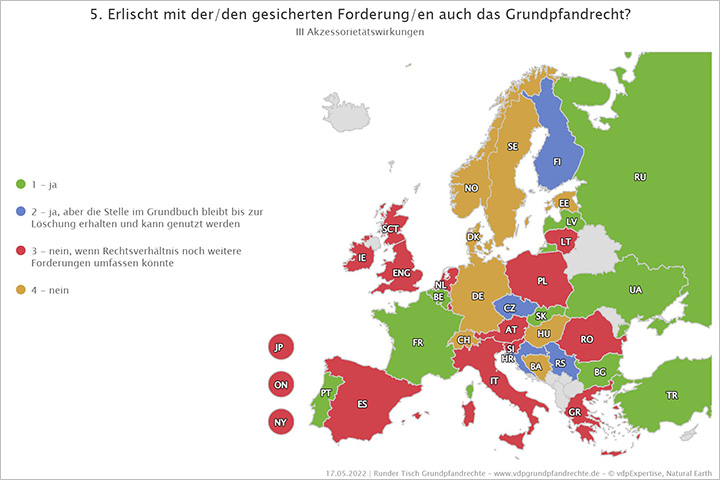Database vdpmortgage
The Structure of the Database
The results of the Round Table’s work are collected in the Database vdpmortgage and published online. The internal database (into which members enter their answers) is arranged into 12 chapters, each devoted to a different legal topic. The chapters address the lifecycle of an immovable security right, its use in practice and further relevant areas of law.
I. Types of Immovable Security
II. Public Disclosure Requirements and Protection of Trust
III. Effects of Accessoriness
IV. Enforcement
V. Insolvency and Reorganisation
VI. Utilization in Practice
VII. Renewable Energy
VIII. Special Purpose Vehicles
IX. Lease / Emphyteusis
X. Qualified Common Ownership
XI. Security of Transaction regarding Immovable Property
XII. Consumer Protection in the Context of Loans Against Immovable Property
Hitherto, chapters I –VI have been incorporated into the public database and are therefore available online. Chapters VII–XII will be added to the public database gradually. The questions in a given chapter may not all be published simultaneously.
Rather, publication of some will be delayed where, for instance, changes in national rules mean that particular questions or answers are no longer appropriate for some systems. These delays explain why the numbering within particular chapters of the public database is not continuous.
Presentation through Mapping
The answers to each of the questions are displayed on a map of Europe in which each country is shown with a colour which corresponds to the answer given for the relevant question. This allows for a readily comprehensible overview of the comparative picture even in cases where the question is quite complex.
There are over 300 maps with questions and answers and they are available in either English or German. The explanations and comments are in either German or English, according to the preference of the relevant member of the Round Table.

Figure: Example map from the vdpmortgage database
Target audience for the Database
The Database vdpmortgage makes the work of the Round Table for Security Rights over Immovable Property available to the following groups:
- Lenders, who use security rights over immovable property in foreign jurisdictions as collateral,
- Investors, who invest in immovable property in foreign jurisdictions,
- Private individuals who possess immovable property in other countries,
- Those who are involved in EU legislation which covers the relevant area of law,
- Those who wish to contribute to national legislation and to learn about the approaches taken and advances made in other countries,
- Regulators and
- Scholars engaged in comparative law or who want to incorporate reference to foreign legal systems into their research on domestic law.
Shortcomings
Multiple-choice questions have significant advantages in facilitating presentation of the material in a readily comprehensible and accessible manner. Certain disadvantages must, however, be acknowledged:
– Questions and answers must be expressed briefly and therefore cannot capture complex situations. In principle, the answers should be appropriate for multiple legal systems. Otherwise, overarching structures are not evident. However, this also means that the answers will only correspond to the basic principle underlying the rules in a given system rather than capturing every point of detail. Some exceptions and details of national law will not be captured.
– Only one answer can be given for each legal system. If a country has multiple types of immovable security – as is the case in Germany with the Hypothek and Grundschuld, one must be chosen and (nearly) all of the questions answered on that basis. It is not appropriate to answer some questions by reference to one type of security and others by reference to another: this would make little practical sense. Therefore, answers are given with reference to the most flexible and widely used type of security. The same principle applies to other legal institutions where there are multiple forms, such as Baurecht and condominium ownership.
– Local variations within a given country cannot be shown. They can, however, be identified in comments.
